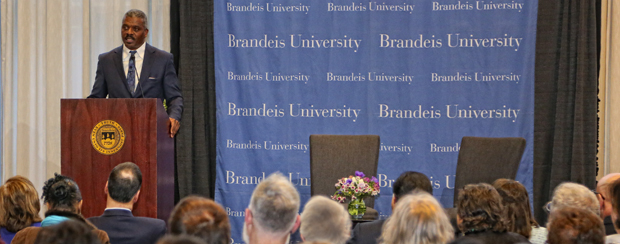Rev. Jeffrey Brown, a transformative clergyman, honored with Richman Fellowship
Brown received the Richman Fellowship for his work with youth on the streets
 Photo/Mike Lovett
Photo/Mike LovettRev. Jeffrey Brown
In the early 1990s, a terrible phenomenon was sweeping through Boston. There were 152 homicides and 1,100 shootings in 1990 alone. Youth violence was out of control.
The old efforts at engaging youth and combating street violence clearly weren’t working. The Rev. Jeffrey L. Brown was among a small group of Boston area clergy who began to take a different approach.
They came up with a plan: To reach out rather than pull in. To listen rather than talk. And to take to the street corners of Boston's most gang-inflicted neighborhoods in the middle of the night.
Brown visited the Brandeis campus this week as the 2017 Richman Distinguished Fellow in Public Life. He participated in a variety of activities and discussions including the annual Richman lecture at Rapaporte Treasure Hall on Wednesday.
"It was not enough to try to bring youth within the four walls of our sanctuary. We had to leave the four walls of our sanctuary. We had to meet the youth where they were," Brown said during the lecture. "And so we started to walk collectively...and as we walked we decided to listen and not preach."
Brown and his fellow clergy formed the TenPoint Coalition in 1992, which implemented a model of social responsibility over the course of the 1990s featuring programs like gang mediation and partnerships with community policing efforts. The youth homicide rate declined from a high of 73 deaths in 1990 to zero between 1995 and 1998. The city saw a dramatic overall reduction in homicides, dropping by 79 percent and reaching a 38-year low in 1999.
The transformation is often referred to as “the Boston Miracle" and is viewed as a model of reducing gang violence. While the clergy are often credited for this transformation, the entire community played a role: Police officers who were willing to view their role in a different way, youth sports organizers who started late-night basketball programs, and ordinary people who opened their homes and lives to young people, Brown said.
"When people talk about the Boston Miracle, they usually refer to the clergy, but the miracle wasn't a series of solo acts," he said. "It was a choir, a large and magnificent choir, throughout the city, there were so many unsung heroes in that effort."
Brown has since gone on to found RECAP, which seeks to recreate the success of the Boston Miracle in communities across the country and beyond.
Before he delivered the lecture, Brown was formally honored by Brandeis President Ron Liebowitz and Heller School Professor Jon Chilingerian with the Richman Fellowship.
"In granting this honor to Reverand Brown we not only recognize a great citizen whose vision and courage transformed cities, but also express solidarity with people and communities that share a commitment to social justice and to supporting each other. It is needed now more than ever," Liebowitz said.
The Richman Fellowship was created by Brandeis alumna Dr. Carol Richman Saivetz '69, and her children, Michael Saivetz '97 and Aliza Saivetz Glasser '01, in honor of her parents, Fred and Rita Richman. The fellowship recognizes individuals active in public life whose contributions have had a significant impact on improving American society, strengthening democratic institutions, advancing social justice or increasing opportunities for all citizens. The fellowship is hosted by the International Center for Ethics, Justice and Public Life on behalf of the Office of the President.
Categories: General





